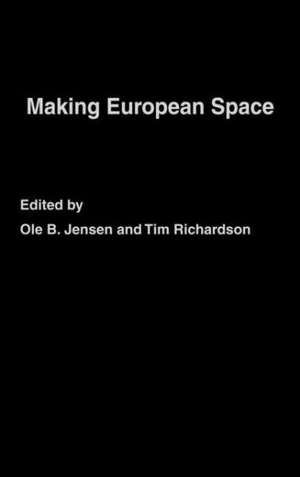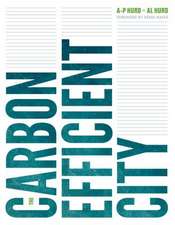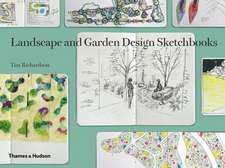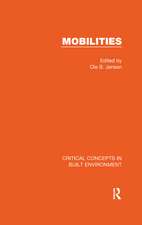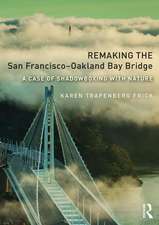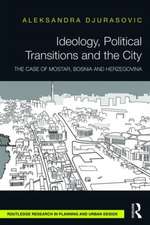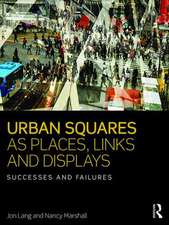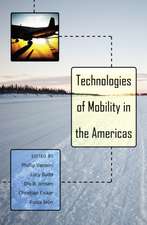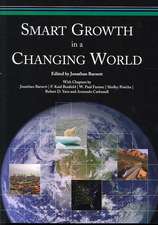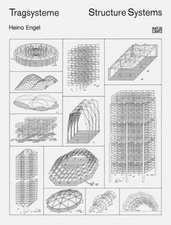Making European Space: Mobility, Power and Territorial Identity
Autor Ole B. Jensen, Tim Richardsonen Limba Engleză Hardback – 25 dec 2003
| Toate formatele și edițiile | Preț | Express |
|---|---|---|
| Paperback (1) | 269.41 lei 6-8 săpt. | |
| Taylor & Francis – 4 dec 2003 | 269.41 lei 6-8 săpt. | |
| Hardback (1) | 481.10 lei 6-8 săpt. | |
| Taylor & Francis – 25 dec 2003 | 481.10 lei 6-8 săpt. |
Preț: 481.10 lei
Nou
Puncte Express: 722
Preț estimativ în valută:
92.06€ • 96.37$ • 76.17£
92.06€ • 96.37$ • 76.17£
Carte tipărită la comandă
Livrare economică 05-19 aprilie
Preluare comenzi: 021 569.72.76
Specificații
ISBN-13: 9780415291927
ISBN-10: 0415291925
Pagini: 304
Dimensiuni: 156 x 234 x 20 mm
Greutate: 0.73 kg
Ediția:1
Editura: Taylor & Francis
Colecția Routledge
Locul publicării:Oxford, United Kingdom
ISBN-10: 0415291925
Pagini: 304
Dimensiuni: 156 x 234 x 20 mm
Greutate: 0.73 kg
Ediția:1
Editura: Taylor & Francis
Colecția Routledge
Locul publicării:Oxford, United Kingdom
Cuprins
Part I: Introducing the Construction Sites of European Space 1. Introduction 2. European Integration and the Emergence of European Spatial Policy 3. Linking Discourse and Space Part II:Analysing the Discourse of Monotopia 4. Languages of European Space 5. Being on the Map: the New Iconographies of Power Over European Space Part III: Spatial Practices 6. Shaping a Pan-European Spatial Planning System? 7. Creating New Knowledges of Europe 8. The Europeanisation of Spatial Planning Part IV: Power, Rationalities and Knowledge 9. A Europe of Flows: Creating the Preconditions for Monotopia 10. Dimensions of Monotopia: Exploring the ^D<'Magnetic Triangle^D>' 11. Conclusions: Making European Space?
Recenzii
'This is a fine contribution to the literature on European public policy and planning. It develops a critical approach to the European integration project, as this political idea is being translated into conceptions of the spatial organisation of the European territory and into resultant policy initiatives. Grounded in the new relational and multiscalar geography and in recent debates on planning theory, Richardson and Jensen provide a robust analysis of the power dynamics of contemporary European spatial policy initiatives.' - Patsy Healey, University of Newcastle
'Europeanisation is probably a more physical process than many of us realise. Jensen and Richardson show the many different sites at which the new spatiality of Europe is constructed showing the power play at work, and the different 'Europes' that actors seek to impose on others. Indispensable reading for a full understanding of politics in Europe.' - Professor Maarten Hajer, University of Amsterdam
'This book offers painstaking analyses of transnational planning practices.... the book enlightens by laying bare power struggles and alerting us to the complexities and contradictions involved in 'Making European Space'.' - Andreas Faludi, University of Nimegen, The Netherlands
'Europeanisation is probably a more physical process than many of us realise. Jensen and Richardson show the many different sites at which the new spatiality of Europe is constructed showing the power play at work, and the different 'Europes' that actors seek to impose on others. Indispensable reading for a full understanding of politics in Europe.' - Professor Maarten Hajer, University of Amsterdam
'This book offers painstaking analyses of transnational planning practices.... the book enlightens by laying bare power struggles and alerting us to the complexities and contradictions involved in 'Making European Space'.' - Andreas Faludi, University of Nimegen, The Netherlands
Descriere
Making European Space crystallises and critically examines the key policy ideas emerging in the new field of European spatial planning, and explores the arguments surrounding policy themes such as polycentric development, sustainability,
